#Mouse (Dragon Age)
Explore tagged Tumblr posts
Text
In Defense of Spirits
Or, alternatively:

I. Introduction
Spirits are one of my favourite parts of the Dragon Age lore, but they didn't start that way! Initially with Origins the various demons I fought I considered little more than cannon fodder, enemies put in my way to cut down so I could move on with my mission. With the introduction of Justice in Awakening and Dragon Age II coupled with Merrill’s alternate perspective also introduced in the latter, my feelings about them started to change. Solas and Cole crack those feelings wide open come Inquisition, and when replaying the games I found myself questioning the motivations of encounters with people I once considered one-note enemies.
I wanted to compile a list of these alternate readings of the various spirits we meet throughout the series, starting first with Origins. I'll be detailing some common themes and, where it’s appropriate, to defend their actions. This list is not comprehensive as there are some encounters I don’t consider significant or interesting enough to mention, although if someone’s curious about a particular spirit I’m happy to oblige. For the purposes of clarity, if I use the word “spirit” I am still referring to all denizens of the Fade, whether they call themselves Pride or Compassion. I may use the word “demon,” as a treat.
The purpose of this retrospective is to reflect upon the motivations of the spirits we kill through the series and how I think Bioware successfully created a world where, in this instance, we were sucked into their preconceived biases regarding spirits. And hopefully to make you feel as bad as I do when I’m forced to kill spirits who probably are better people than my player characters. I am also not arguing that everything I put forth here was intended by the writers. I have the reach and flexibility to pull out threads they didn’t expect me to.
Finally, this won’t be an exhaustive examination. There are a lot of spirits and some don’t invite discussion on my part.
II. Analytical Lens
There are several recurring themes that will crop up when I’m recontextualising the motivations of the spirits throughout the series. We’ll be going over these in detail as we talk about individual spirits, but for now:
The Veil is a construct. There was initially no barrier stopping them from moving back and forth freely, and in many ways their desire to manifest physically outside the Fade is a natural inclination. The problem being that going there and back again isn’t as easy as it once was.
They don’t understand this world. Again, I think the presence of the Veil exacerbates this. Time and again we see spirits who do have enough will to manifest safely have difficulty adjusting.
Trying to help hurts. Spirits can’t sicken with Blight or the common cold (that we know of), but intense emotions or cruel intentions can twist them from their purposes. Those who reach out in the honest urge to help may find themselves burned, sometimes through no fault of either party.
Their design encourages dehumanisation. For lack of a better word, considering this is a land of elves, dwarves, qunari, and so on. Many of the spirits we’re asked to empathise with are humanoid, with those we are at odds with being more likely to be monstrous or animal in design, making it easier to justify why we need to choose violence.
III. Dragon Age: Origins
Mouse
Mouse is among the first spirit players will meet in Dragon Age, depending on whether or not they play the Mage origin or not. Narratively he is meant to introduce the player to the role spirits often play in the lives of mages, that is to say: an evil that is not always self-evident. He tells a sympathetic lie, presents himself as someone who was once in a position like the protagonist currently is, and wants to make sure they don’t end up like him, only for it to be revealed that the entire reason he’s there is to possess them. At least, nominally that’s his role. A second pass at Mouse’s actions does raise questions as to his true intentions.
Throughout the test Mouse encourages two things within the protagonist: their self-worth and their questioning of the ritual. The former makes sense, he is ultimately revealed to be a spirit of Pride and so to stoke the protagonist’s own pride may inflate their confidence to a point where they can’t see the potential harm in dealing with him. Still, in a society where magic is feared and mages prisoners, there is something radical in encouraging that in someone. Especially when paired with remarks Mouse makes where he questions the logic of the Harrowing itself:
“It isn’t right they do this, the Templars. Not to you, me, anyone.”
This is one of the first things he says to you, and is one of the first pieces of Circle critical rhetoric in the entire series. From the perspective of the protagonist at the time, it would seem he’s referring only to apprentices, but is he? Spirits are drawn into the Harrowing as much as mages, ostensibly willingly with the promise of a body to possess, but we see in rituals such as the one that drew Wisdom into the world that the Circle isn’t above shackling spirits into doing their bidding, be it as a means of protection or garnering information. Once inside, they’re subject to the will of the apprentice, who have been taught to fear and mistrust the Fade since they were first brought to the Circle. So is Mouse expressing bitterness about the situation of the apprentices, or is he looking at the situation as being equally unfair to all involved?
Furthermore, what’s most interesting about Mouse is he never actually tries to possess you. He makes some requests, which Surana or Amell can’t agree to, but even if you avoid catching onto his game for as long as you can it never goes farther than that. He reveals himself as the final test and before the Harrowing ends he dispenses the to-be Warden a warning:
“Simple killing is a warrior’s job. The real dangers of the Fade are preconceptions, careless trust… pride. Keep your wits about you, mage. True tests never end.”
A piece of wisdom, if you will.
I don’t believe Mouse ever truly intended to possess you, although it’s impossible to tell if he truly would or not without the ability to agree to his bargain. He gives up the game too quickly, with the Warden only needing to vaguely doubt his story before he reveals it. By following the Warden through their Harrowing he helps them successfully bargain with spirits like Valor and Sloth and safely introduces the idea that not everything here is as it seems. Rather than being purely a Pride demon, I think Mouse is a spirit of Wisdom influenced by the Warden’s preconceptions towards what some might call the darker aspect of the values he represents.
While I don’t think it’s out of the realm of possibility that Mouse was exactly what we’re led to believe, nevertheless I believe it probable that spirits aren’t always gleeful participants in the Harrowing and that the rite is damaging to them as well as the apprentice mages.
Desire
We go now to another spirit from the Circle, specifically the Desire demon we meet in the Broken Circle quest. When we come across her she’s possessed a Templar and letting him live out a fantasy of having a wife and children. When the Warden and their party come across her, she argues that she’s giving him what he wants and doesn’t see the harm in it. Upon my first playthrough I took this as a lie and killed her, although it was difficult not feeling bad, as from the perspective of the enthralled Templar he died defending his family from bandits. To him the Warden was unequivocally the bad guy, and it’s tragic thinking about what his final thoughts might have been.
As for Desire herself, I think there’s an argument to be made that she simply didn’t see a difference between her making a life for herself and the Templar all within his head and a physical, lived life. We see in Inquisition especially, where we talk to more spirits, that the nature of the physical world is as alien to them as the Fade is to mortals. Command wonders out loud why the rocks do not move at her command, and Cole asks Varric to talk to his shoelaces for him because they “don’t listen to him.” They existed in a world where will mattered more and where dreams were real, so it stands to reason that to Desire there is no discernable difference between giving him what he wants for real and dreaming it.
Interestingly, you can choose to let them both go, and we get no indication of where they go from the Circle. Leliana also approves because she thinks what counts is that he’s happy. Personally I don’t feel there’s a right option in this quest as either leaves the Templar in a tragic spot, but I do think the Desire demon’s motivations aren’t as evil or manipulative as they seemed on my first playthrough.
Lady of the Forest
The Lady is perhaps the first spirit in the series given a more complicated character than “spirit good, demon bad.” We have Valor in the mage origin, Wynne’s spirit of Faith, etc, but they aren’t given much characterisation and their benevolent nature is taken as a matter of fact. We have a biased introduction to her, we see the damage she has done to Zathrian’s clan and hear his side of the story. We go into the forest to carve the heart from her chest.
But when the time comes to actually speak with her, his bias and deception is plain. She has all the trappings of a demon: summoned at a point of great tragedy, as a tool of vengeance, enacting a literal curse upon Zathrian’s enemies. Yet now she is an advocate for non-violent solutions, only compelled to violence by desperation (she sent letters but Zathrian left her on read) or by the player’s encouragement (potentially). I do think this was an end she worked towards, and didn’t come by naturally, saying to the Warden at one point:
“Then the time has come to… set our rage aside. I apologise on Swiftrunner’s behalf. He struggles with his nature.”
While she is speaking of Swiftrunnher, given she is the curse’s origin, I think the same could be said of her nature (as it is her curse). Zathrian implies much the same, saying to her:
“Your nature compels it, as does mine.”
I think it’s very likely that had we encountered the Lady those hundred years ago when she was first made, she would have been to our eyes a demon, rather than the semi-benevolent force of nature she appears as in-game. Interestingly, her outward nature doesn’t change if she is compelled to kill the Dalish. She isn’t thrilled, but neither is her nature twisted. She’s pretty quick to move on, afterwards. Of the major spirits in DA:O, I do think she is an outlier in the series. Killing her is the bad option, especially when a mutually beneficial solution is forced upon you. She also has a stronger presence of mind than many of the other spirits, perhaps accounting to her age and the fact that she is tethered to the world through not only Zathrian but her ‘followers.’ It’s fitting that the Dalish quest is the one where a spirit is presented not only sympathetically, but (as far as I can tell) exclusively referred to as a spirit whether they are doing right or wrong.
Rage
We meet many Rage demons in Origins, and throughout the series, but the spirit I’m referring to are the ones we meet in the Alienage’s orphanage. The recent site of a massacre, the orphanage is now home to a spirit of Rage who attacks those who enter. Rage, I thought, was a curious choice, when Despair and Terror exist. Although the fact that they probably didn’t want to make a new spirit model for this one sidequest would probably explain it on a development level, but then I wondered— whose rage?
The spirits don’t seem to embody the rage of the people who massacred the orphanage, or even the rage of the victims. They tell the Warden and Ser Otto that they “do not belong here” and one is furious that the party has killed “my brood.” I think the presence of the spirits here is indicative of how helpful or benevolent spirits can be twisted by the horrors of our world, that they were drawn by the misery of what happened at the orphanage and upon witnessing it they became enraged. They are ultimately protecting nothing, just an empty building that’s probably best torn down or cleared out, or whatever the elves of Denerim’s Alienage decide they need to properly mourn. Yet as we walk through the building the screams of children still play around us, it’s still happening for its current residents.
In the final encounter of the quest, the Rage demon targets and kills Ser Otto (assuming those mabari you encounter like two minutes in don’t get him first, like they do for me every time if I’m not paying attention) first out of your entire party. It makes sense, although his motivation was pure, he is representative of the human justice that allows horrors like this, and what’s more— how many orphans were taken from the orphanage’s midst by people wearing armour just like his, never to return?
The rage demons had every right to be angry, even if their anger manifested in a harmful way. The tragedy is that, outside of Denerim’s Alienage, most people weren’t.
IV. Other
These are spirits whose roles I don’t have much to say about, for one reason or another.
Kitty. I don’t have much to say about Kitty, who as a reminder is the spirit held captive in the basement of Wilhelm, the former master of Shale. Given Kitty can agree to not possess Amalia, content simply to be free of the basement, and then doubles back on that promise once you complete the puzzle, I don’t have the highest opinion of Kitty. However, can I do want to point out that Wilhelm held Kitty captive in his basement for decades for his research. Research which, by the way, was to find ways to prevent mages from becoming possessed. A little ironic that he essentially possessed a spirit to do so. I want to point this out only because I think it highlights how spirits are casually used by people and at no point do we stop and wonder what decades of being locked up in a basement outside of their intended realm of existence might do to someone, even a metaphysical someone.
Herren. The merchant and life partner of the blacksmith Wade, who may have made your Warden some nice armour from all those endangered dragons they killed. In the Darkspawn Chronicles Herren is fought— as a desire demon. Gaider says this is not canon, but he doesn’t even go here anymore, so instead I’d like to put forth the idea that Herren is a desire demon taken physical form who lives out his existence peacefully (if somewhat grumpily) with his eccentric husband. I have no evidence of this being a fact, in fact I have the opposite of evidence, but I like my version better, so.
The Grand Oak. I think everyone with a modicum of taste likes this guy, but I do think he's an interesting lens to look at how spirits in Elvhenan might have lived. I like to think all of them had a period where they just vibed as a tree for a hundred years or so.
#dragon age#dragon age meta#dragon age lore#dragon age: origins#lady of the forest#mouse dragon age#long post#my writing#i have no idea what to tag this tbh
196 notes
·
View notes
Text
I like to think that the tutorial-level pride demons are all the same very supportive guy. A pride demon that just delights in doing up its makeup and costume to be maximally scary, then running up to level 1 heroes and giving them a tough but beatable challenge.
And because it feeds on their pride, it doesn’t have to worry about dying permanently, it just pops back up ready for the next hero.
#dragon age#dragon age spoilers#dragon age headcanon#mouse dragon age#dragon age origins#dragon age inquisition#dragon age the veilguard
25 notes
·
View notes
Text

CONFESSION:
i’m currently replaying origins, and i personally think it would’ve been cool to have the option of letting mouse in and (somehow) getting away with it during the harrowing in the mage origin. imagine it: just you, your merry band of misfits, and a funky little demon kicking darkspawn butt.
99 notes
·
View notes
Text

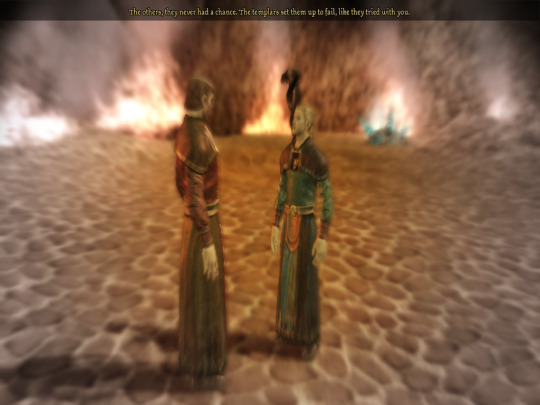
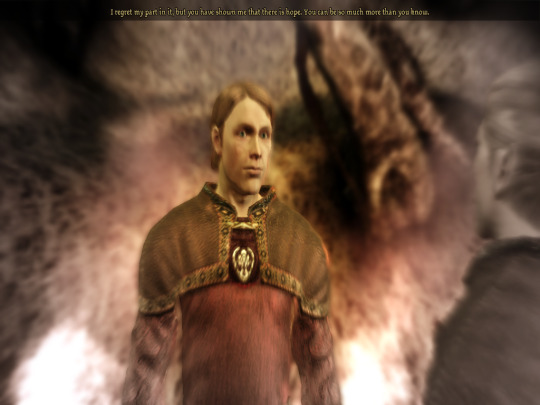
Mouse: You made me believe in you. You're a true mage, one of the few. Mouse: The others, they never had a chance. The Templars set them up to fail, like they tried with you. Mouse: I regret my part in it, but you have shown me that there is hope. You can be so much more than you know.
I know Mouse is (or at least appears to be) a pride demon and his main MO seems to be him trying to suck up to the Warden by talking about how great they are, but I don't think this is entirely an act. When Mouse says that the Warden is the only one he's ever seen bargain with Sloth to get him transformed into a bear to help them fight, or the only one he's seen fight or outwit Valour to get a weapon, I think he means that! I don't know if he means the bit about regretting his part in the deaths of multiple apprentices (assuming that that's true to begin with; it's entirely possible that that's as much of a lie as the dead apprentice thing), but I do think he really does respect the Warden's strength and intelligence. The Warden is set up to fail, and instead they shine. They clear the Harrowing in record time! They can outfight Valour, or browbeat it into handing over a staff for free by pointing out that it's acting no better than the demons preying on them! They can win a riddle contest against Sloth and gain its willing (if sarcastic) aid without having to actually give it anything! This young adult, in their early twenties at most, can effortlessly outwit, bargain with, and defeat the denizens of the Fade, and I can definitely see why a pride demon (or spirit of wisdom) would be impressed by that and have high expectations for what they'll achieve going forward.
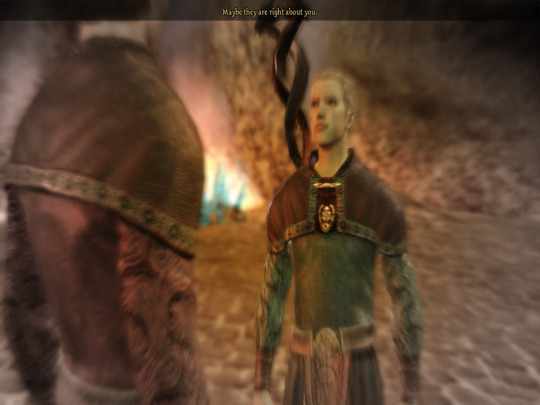
Mouse: Maybe they are right about you.
I believe this line in context is about the Chantry and the Templars and their fear of what mages can do? ...Yes I just played this like two hours ago and I've already forgotten shut up. But when Mouse is caught out, he doesn't attack or otherwise try to take the Warden over by force. He accepts it, offers a final piece of advice, and... lets the Warden go. Mouse seems to be genuinely ceding victory to the Warden out of respect. It might have a different feel if he ever showed up again, but... he doesn't. The Warden wins. It's one of the few pure victories in DAO; no sting in the tail, no compromise to be made, no losses. You just... win. You might not kill your enemy, but there's no sense of Mouse looking down on you or dismissing you as a non-threat: he looks at you and sees the best the Circles can possibly create, and says "You have nowhere to go but up", and he lets you go to see what you can become. Mouse seems to actually want the Warden to succeed. And having Surana/Amell in particular's first taste of combat and danger in the game end in such total success and acceptance and respect feels important? Mages in Thedas are feared, but never respected (despite them being incredibly powerful; Surana and Amell are absolutely the most powerful Wardens by a mile and I will fight you on that), so it means something that it wouldn't with say Cousland or Aeducan that the end of the first section of their origin is such a powerful being showing them the respect required to let them go.
86 notes
·
View notes
Text

Not to be dramatic but if we dont get a wholesome scene of Rook comforting Lucanis during his romance I will set myself on fire
I am gonna be so normal about Madeleina and Lucanis (lie)
#lucanis dellamorte#lucanis#rook x lucanis#dragon age veilguard#datv#dragon age the veilguard#fanart#my art#finally Madeleina gets an actual appearance and shes not just a blue mouse#rook#rook mercar
247 notes
·
View notes
Text

Harding/Neve thoughts percolating
264 notes
·
View notes
Text
spite you little freak LOL
#looks like spite/determination is a bit of a celebrity in rivain#poor lucanis lmao#lucanis#lucanis dellamorte#spite#seiren thorne#rook#datv spoilers#spoilers#dragon age the veilguard#veilguard spoilers#i nearly threw my mouse when spite went like THAT out of nowhere#neve gallus#her side eye lmao
107 notes
·
View notes
Text

been thinking about mouse and danyya in dav....and how their youngest especially is obsessed with manfred
#dragon age#dragon age oc#dragon age veilguard#manfred#da manfred#mouse adaar#danyya lavellan#my art
122 notes
·
View notes
Text
Essence of a Babygirl (a tumblr joke essay)
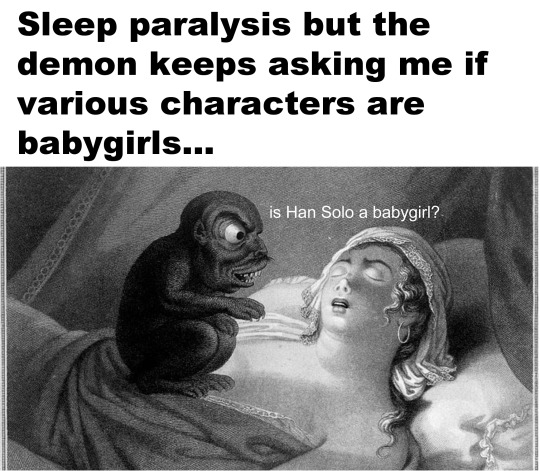
Babygirl, the term has spiked in popularity, but what is a babygirl? Is the term a bit more complicated than at first glance? What is the essence of a babygirl? Today I will be answering these questions.
Urban dictionary describes babygirl as thusly:
“A term used towards grown fictional men who have the fandom in a loving chokehold.”
A Mashable article titled The internet's 2022 horny dictionary defines babygirl as
“... a term of endearment for when a man is being cute, comfortable in his masculinity, or weak in an evocative way.”
These descriptions are wholesome. They create an avenue of masculinity that can be vulnerable and attractive at the same time. A term for a type of masculinity that creates room for a multi-dimensional character in fiction. Various fictional characters have been affectionately dubbed as “babygirls”. One of the most well known being Leon Kennedy from the Resident Evil franchise.
However the term is also used to describe characters that are remarkably not wholesome. Characters like Izzy Hands, played by Con O’Neil from the incredible show written by David Jenkins called Our Flag Means Death and Marvel’s Loki, played by Tom Hiddleston, have been called babygirls. This must indicate a spectrum of “babygirlness” that scales from wholesome to not wholesome.

A good babygirl can be seen at a glance, but what makes these other characters part of that babygirl spectrum on the negative side? As my colleague (@robogart) and I studied the issue we realized that negative babygirlness included more nuance.
We created a study group to determine what attributes make up a bad babygirl. Included in our study was: Izzy Hands (Our Flag Means Death), Gal Dukat (Deep Space 9), David Xanathos and Oberon (Gargoyles), Anders (DA2), Yami Bakura (Yugi-oh, 4kids Production), King of All Cosmos (Katamari), Patches (Fromsoft), Ratagin (Great Mouse Detective), and the Six Fingered Man (Princess Bride).
The five characteristics that we found amongst all of the babygirls we picked from various media were: being decidedly not wholesome, pathetic, emotionally unhinged and dastardly, but all in all containing some kind of charm.

We went through and put all of our babygirls to the test with our system. The results were surprising, with Izzy Hands coming out decidedly less babygirl than we predicted and Ratagin being the epitome of babygirlness.

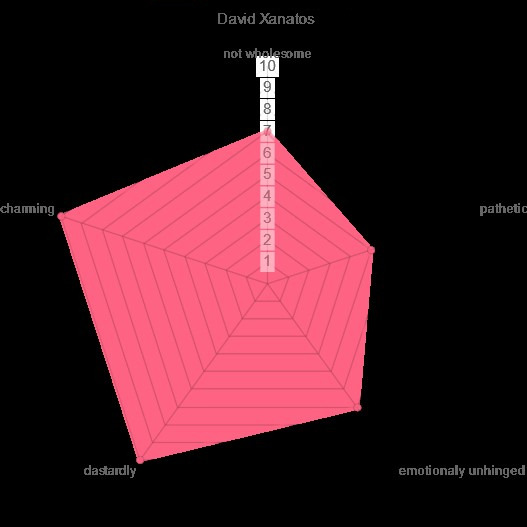



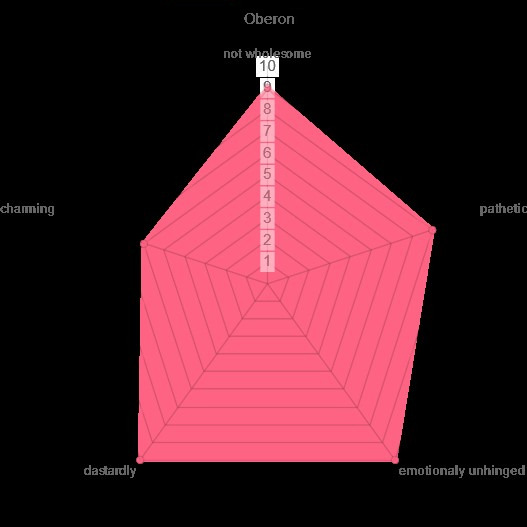

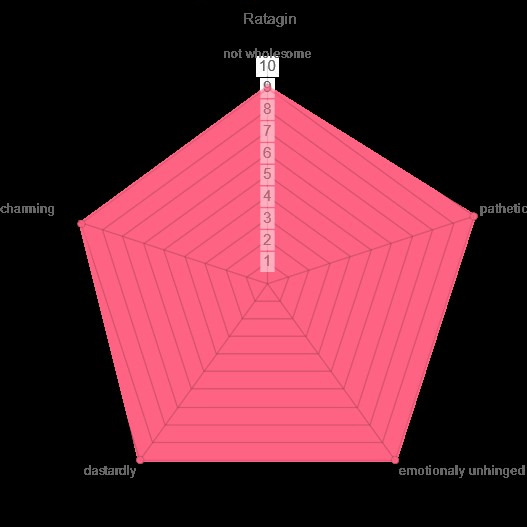
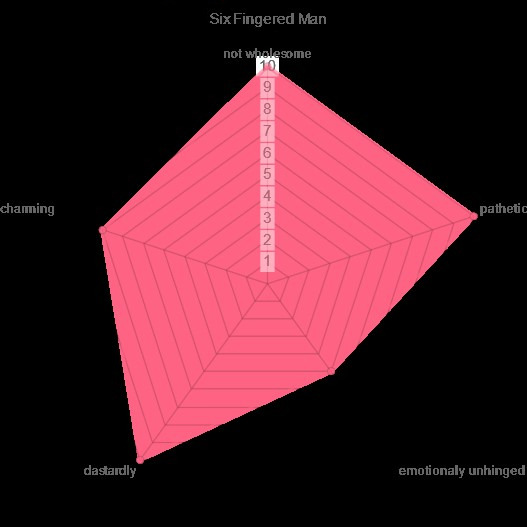

What did these tests show about babygirlness on a whole? The spectrum ranges from morally good characters to bad, but all share a few common traits. However they express their vulnerabilities, either as completely unhinged or emotionally accessible, we as the audience are captivated and find “their weakness evocative”. Another aspect that is continuous through the spectrum of babygirlness, whether good or bad, is that a babygirl is secure in his masculinity however he chooses to express it. Babygirls on either end of the spectrum do end up having a “loving chokehold on their fandom”. Those people in the fandom are not necessarily of quantity, but of quality. Especially for the baby girls on the “bad” end of the spectrum.
In conclusion a babygirl can be summed up as a fictional male character that is evocative in his vulnerability and at the same time confident in his masculinity regardless of his moral compass.
Co-Written with @robogart
THANK YOU FOR READING ALL THE WAY TO THE END OF THIS SILLY LITTLE ESSAY!
Please feel free to copy and paste the bad babygirl diagram and see where you babygirls fit!! I am excited to see your favorites!!
#babygirl#dragonage#gargoyles#ds9#our flag means death#great mouse detective#yugioh#princess bride#oberon#izzy ofmd#gul dukat#anders dragon age#katamari#david xanatos#yami bakura#ratagin#king of all cosmos#fromsoft games#patches#memes
856 notes
·
View notes
Text

Started playing Dragon Age Origins tonight.
My poor little Mika, haunted by the demon of the Kitchen Nightmares drama sound.
82 notes
·
View notes
Text

just laughing about this research fellow just trying to work on their thesis about fade sand and not only dealing with helpful wisp skeletal assistants trying to dustpan it away but also random adventurers just sliding through it willy nilly but also FADE SAND WTF. is it made of something else horrifying? is it full of magic? is it dead spirits somehow? if it's seemingly trickling endlessly, is it actually trickling through the fade into the world and then back in a loop?? there's so much happening with just this tiny throw away note lol
#veilguard#datv#veilguard spoilers#dragon age spoilers#dragon age#datv spoilers#do not touch my sand#the mourn watch#nevarra#i think the necropolis might have my favorite flavor text environmental notes#q#screenshot#sorry i just like pointing out the fun little things i find#drop them on the dash like a very pleased cat with a concussed mouse#the necropolis#fade sand#i have so many questions#fen plays datv
42 notes
·
View notes
Text
I just did the Lucanis 's mind palace mission and god fucking damnit
The notes as thought fragments? The echoes speaking what his mind thinks of itself (and the way that Rook sees right through it)? The stuff about the war for the First Talon seat?
"These problems you can kill with a blade. Now, healing? Living with a demon? It doesn't have easy answers and you're afraid of hurting the people you care about"

#excuse me while I go stare at the ceiling for the next ten minutes#just end me already#dragon age the veilguard#lucanis dellamorte#veilguard spoilers#also the callback to the fade mission on DAO? 'whats next well turn into a mouse and fight some spiders?'
38 notes
·
View notes
Text
if there are any Indonesian Solavellans out there...
I would like to inform you that our own trickster figure, si Kancil. Is deer-like.

And what else is deer-like? A halla.

Kancil/halla Lavellan and wolf Solas is invading my brain like worms please help me. Best part about this is that a kancil would definitely be able to outsmart a wolf.
#in my eyes at least#RELEASE ME FROM THIS BRAINWORMS AAAAAAAAA#solavellan#halla#dreadwolf#dread wolf#solas#lavellan#yapping#kancil#chevrotain#mouse deer#datv#dai#dragon age inquisition#dragon age the veilguard
26 notes
·
View notes
Text

A normal mage build.
#dragon age origins#asterius surana#y'know i love how the game doesn't show you the base stat vs buffs unless you mouse over it#so you can't see it but he's only actually getting +6 to magic right now#versus the +58 con buff#when i say i want to make a viagra joke every time i look at his stats...
20 notes
·
View notes
Text
✨The Harrowing (Pt 1)✨



Mouse, with a serious/determined expression: “You fight the creature, you’re resisting it. If it wins, it defeats you and possesses you.”
Vasya, thoughtfully: “Combat is a battle of wills, so will itself is combat?”
Mouse, exasperated, looking into the “camera”: “I … guess the reverse is also potentially true. That’s a very complicated thing to consider. I’d stick with killing it.”
Part 2:
So I am currently on my Vasya playthrough, which is a rather funny experience in that I get to make her an absolute twit. Star pupil, neurodivergent, very much a nerd. She passes her Harrowing without fighting anyone except Rage by the merit of being simultaneously manipulative and insufferable.
This is straight up one of my favourite options in that section because Mein Gott, Mouse is so tired of this, and her asking him every possible question 😭 like Vasya babygirl just fight the demon pls.
Also I wanted to note here that yes, Vasya wears human mage apprentice robes and elven mage robes. That’s on purpose >:)
#art#badart rambles#my art#my oc#oc#oc:Vasya#grey warden#warden amell#dragon age#dragon age mouse#mouse#dao#dragon age origins#comic#this is now old as hell but I kept forgetting to post it
225 notes
·
View notes
Text

The ghost of KH3 still haunts me
#dragon age#kingdom hearts#datv#dragon age the veilguard#i feel like i got subliminal training to associate any group of 3 circles with the mouse#punkryuki
14 notes
·
View notes